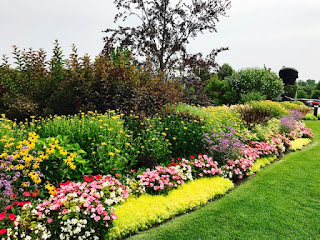
How to decorate winter window boxes with greens?
The county farm market's full of clipped greenery these days. Driving away empty handed, I can't help but imagine the field of sad scalped trees that contributed to these lush displays
There's plenty of free foliage available at the curb or on the woodland floor.

Late fall containers seem barren following the peak brilliance of summer. There's a lovely fix.
Using freely available natural vegetation, insert a collection of spruce, pine and shrub droppings to moist bare soil. The longest branches and needles line the base, with upper layers of smaller needled evergreens. Even the fountain gets a cold weather lift.
The most impressive designs incorporate a variety of tones and branches with needles of varying length. Variations break up monotony, supplying depth.
Dried flowers, pinecones, and seed pods complete the look. Hydrangea blooms are stellar. The dried blooms hold their shape until spring. Secure in the soil for windy days.
Pine cones,

birch branches or mossy limbs with interesting color pattern add contrast and character.
 When the first snow ices these arrangements, the effect is
When the first snow ices these arrangements, the effect is ethereal.
Greenery containers add elegance to any residence, porch or balcony.
 And the piney scent is divine.
And the piney scent is divine.MORE GREENS:
Winter Porch Pots
Green Roofs
Shrubbery Flubbery



























